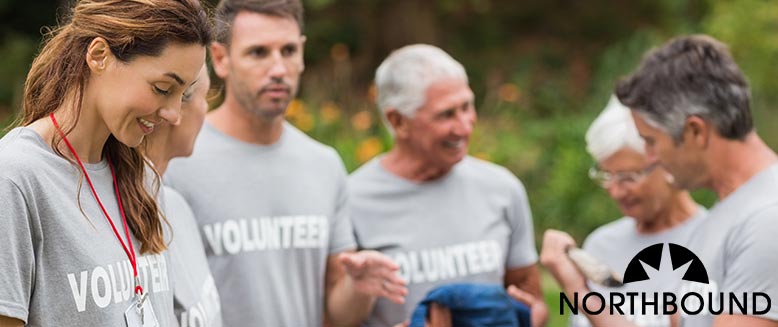Free HBO for life –- the reward really anyone deserves once they’re able to push aside their thoughts on their own difficulties to focus more on ways to improve others’ lives.
But there are other benefits, benefits research shows could kick TV’s butt, benefits that clients here at Northbound have found especially useful for strengthening their mission to celebrate one year of continuous sobriety. Below is a list.
A sense of purpose
No wonder the great American business icon Henry Ford once said it: “To do more for the world than the world does for you, that is success.”
A survey by the United Health Group showed 96 percent of people who have volunteered themselves to a formal cause said it made them feel an increased sense of purpose, of triumph. Whether it’s helping with dinners at a homeless shelter or participating in a big sister/big brother program, forging a positive impact on another individual’s life almost always brings back a strengthened self-view to the volunteer in recovery.
A sense of community
A severe habit that tends to arise during recovery is isolation, which puts recovering addicts at a heightened risk of relapse and several other health issues. Helping others gives those in recovery an “excuse” to emerge out of self-imposed isolation and begin on a road toward comfort in group settings.
According to the Mental Health Foundation website, “Face-to-face activities such as volunteering at a drop-in center can help reduce loneliness and isolation.”
Lower stress
Struggling with addiction is hard enough on top of the realities that everyday life brings — financial insecurities, family obligations, pressures to succeed.
Volunteering is a natural retardant to the feelings of cynicism and self-pity that can surface daily. Those who volunteer report lower stress levels than the general population due to the refocus of energy into a far healthier outlet.
Increase in gratefulness
The purpose that the Global One Foundation has stated for its volunteer programs is to “promote a deeper sense of gratitude as we recognize more of what is already a blessing/gift/positive in our life.”
So often recovering addicts neglect to think about the many individual blessings in their lives. Volunteering to help out others who need assistance can almost instantly bring feelings of gratefulness to those in recovery while they see upfront and personal the shortcomings someone else has to battle.
Improved physical health
If the body could talk, it probably would ask to volunteer – a lot.
A report from the Corporation for National & Community Service, citing how studies have proved volunteering leads to better health, states “those who volunteer have lower mortality rates, greater functional ability, and lower rates of depression later in life than those who do not volunteer.”
Inspiration elevation
A study conducted by researchers from the University of Cambridge, University of Plymouth and University of California, Los Angeles showed that “kindness is contagious.”
Dr. Simone Schnall, one of the directors, elaborated further on the ability of a person to literally initiate action in someone else.
“When you feel this sense of moral ‘elevation,’ not only do you say you want to be a better person and help others,” Schnall said, “you actually do (help others) when the opportunity presents itself.”
Helping others is part of Northbound’s comprehensive treatment model, which is based on the 12 steps of Alcoholics Anonymous and founded on the principle of one alcoholic helping another.
During treatment, clients are taken through multiple evidence-based therapies and empowered to be proactive in their recovery through:
- Attending daily 12-step meetings
- Participating in regular commitments at meetings
- Learning the benefits of being of service to others
- Engaging with the local recovery community
Through integrated treatment options and staff experienced in treating addiction and co-occurring disorders, clients break free from addiction and help others who share a common struggle. They develop a strong support network and get involved in service work, helping them to stay involved in their recovery after treatment.
Author
-

President, CEO & Founder at Northbound Treatment Network
Paul Alexander is the CEO, President & Founder of Northbound Treatment Network in Newport Beach, California. He believes wholeheartedly in transformational leadership, organizational health and effective, fully integrated substance use disorder and mental health treatment. With over 27 years of experience in behavioral healthcare, Paul has extensive knowledge of “in vivo” treatment modalities, clinical development, operations, strategy, marketing and financial planning. He has been widely recognized for his development of collegiate-based residential treatment programs for students in recovery and authored a research study at The University of California confirming this modality’s effectiveness.
Paul’s comprehensive professional experience, willingness to innovate, and emphasis on organizational health are vital factors in Northbound’s continued success. Paul received his Certified Addiction Treatment Specialist training at Saddleback College in Mission Viejo, CA, and was awarded Outstanding Alumni Service Award in 2002. Paul holds a Bachelor of Arts degree in Criminology, Law and Society, Summa Cum Laude, from University of California, Irvine, and a Juris Doctorate degree from Loyola Law School of Los Angeles. Paul currently serves on The National Association of Addiction Treatment Providers (NAATP) board. In addition, he serves on The Family Recovery Foundation board and The CarePossible board in Orange County; both organizations are committed to raising funds for family recovery and treatment for former military personnel. Paul is in recovery himself and lives in Orange County with his wife Silvana and his two young sons, Noah and Dean.










